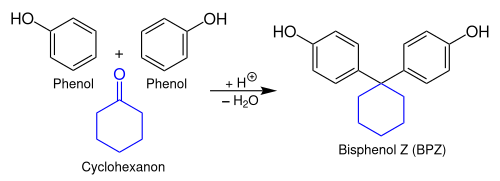Chemistry:Bisphenol Z
From HandWiki

| |
| Names | |
|---|---|
| Preferred IUPAC name
23,24,25,26-Tetrahydro-22H-[11,21:21,31-terphenyl]-14,34-diol | |
| Other names
Bis(4-hydroxyphenyl)cyclohexane
| |
| Identifiers | |
| |
3D model (JSmol)
|
|
| ChEMBL | |
| ChemSpider | |
| EC Number |
|
PubChem CID
|
|
| UNII | |
| |
| |
| Properties | |
| C18H20O2 | |
| Molar mass | 268.356 g·mol−1 |
| Appearance | White solid |
| Melting point | 188 °C (370 °F; 461 K) |
| Hazards | |
| GHS pictograms | 
|
| GHS Signal word | Warning |
| H315, H319, H335 | |
| P261, P264, P271, P280, P302+352, P304+340, P305+351+338, P312, P321, P332+313, P337+313, P362, P403+233, P405, P501 | |
Except where otherwise noted, data are given for materials in their standard state (at 25 °C [77 °F], 100 kPa). | |
| Infobox references | |
Bisphenol Z is an organic compound with the formula (HOC6H4)2C(CH2)5. This white, water-insoluble solid is classified as a bisphenol. It is a precursor to specialty polycarbonate plastics.[1] It is prepared by the condensation on phenol and cyclohexanone:
See also
References
- ↑ Helmut Fiege; Heinz-Werner Voges; Toshikazu Hamamoto; Sumio Umemura; Tadao Iwata; Hisaya Miki; Yasuhiro Fujita; Hans-Josef Buysch et al. (2002). Ullmann's Encyclopedia of Industrial Chemistry. Weinheim: Wiley-VCH. doi:10.1002/14356007.a19_313. ISBN 978-3-527-30673-2..
 |

